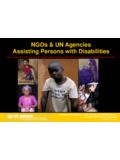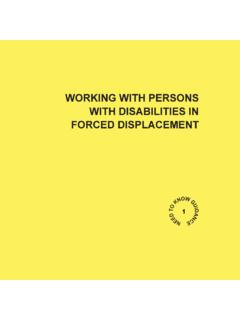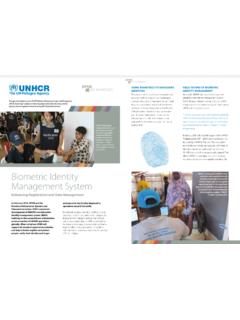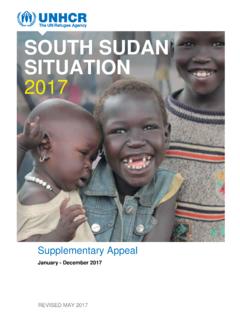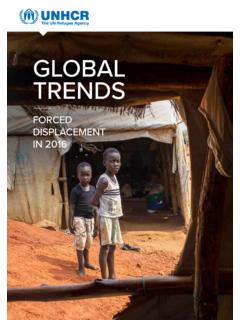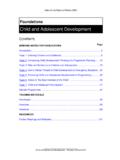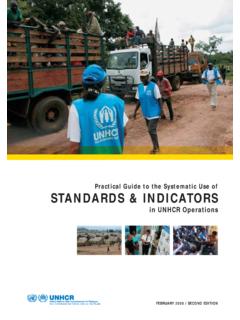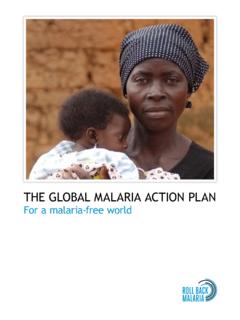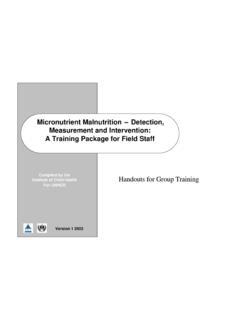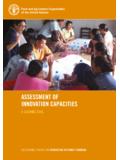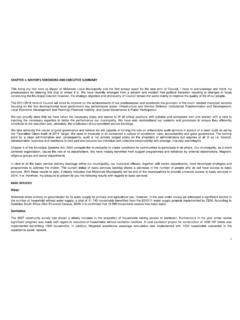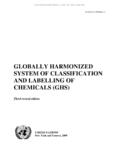Transcription of Note on Family Reunification - UNHCR
1 ANNUAL TRIPARTITE CONSULTATIONS ON RESETTLEMENT Geneva, 20-21 June 2001 _____ Background Note for the Agenda Item: Family Reunification IN THE CONTEXT OF RESETTLEMENT AND INTEGRATION Protecting the Family : Challenges in Implementing Policy in the Resettlement Context I. GUIDING PRINCIPLES: PROTECTION CONCERNS AND HUMANITARIAN CONSIDERATIONS 1. There are five guiding principles that sustain UNHCR efforts to protect Family unity, and to promote and facilitate Family Reunification in the resettlement process. These are: a) The Family is the natural and fundamental group unit of society, and is entitled to protection by States. UNHCR promotes Family Reunification to protect and preserve the unity of this fundamental unit of society, to restore basic dignity to a refugee s life, and especially to provide protection for children under the tutelage of parents or other related adults.
2 The policy on Family Reunification also follows basic humanitarian considerations as well as practical concerns to increase the potential of refugees in their integration or re-integration process. b) The refugee Family is essential to ensure the protection and well being of its individual members, and as such its protection is within the mandate of the Office. Based on the mandate to provide international protection to refugees and help them find durable solutions, UNHCR promotes the unity of the refugee s Family . Assuring the unity of the Family is a principal means by which the refugee Family is protected. When refugees leave their homeland, Family members are frequently separated as some are left behind and others are forced to flee at different times through separate means. Resettlement, as a tool of international protection, involves preserving and restoring the basic dignity of a refugee s life, including promoting the Reunification of the refugee s Family .
3 This requires that States take measures, including national legislative efforts, to preserve the unity of the Family . It also requires corollary measures to reunite families that have been separated, through programmes of admission, Reunification and integration. c) The principle of dependency entails flexible and expansive Family Reunification criteria that are culturally sensitive and situation specific. Given the disruptive and traumatic factors of the refugee experience, the impact of persecution and the stress factors associated with flight to safety, refugee families are often reconstructed out of the remnants of various households, who depend on each other for mutual support and survival. These families may not 2 Family Reunification IN THE CONTEXT OF RESETTLEMENT AND INTEGRATION fit neatly into preconceived notions of a nuclear Family (husband, wife and minor children). In some cases the difference in the composition and definition of the Family is determined by cultural factors, in others it is a result of the refugee experience.
4 A broad definition of a Family unit what may be termed an extended Family is necessary to accommodate the peculiarities in any given refugee situation, and helps minimize further disruption and potential separation of individual members during the resettlement process. The principle of dependency requires that economic and emotional relationships between refugee Family members be given equal weight and importance in the criteria for Reunification as relationships based on blood lineage or legally sanctioned d) Humanitarian considerations support Family Reunification efforts. Separated families can only enjoy life through the reunion of Family members in a country where they can live a normal life together. Therefore, refugees and other persons in need of international protection who have no other country than the country of asylum or resettlement to lead a normal Family life together should be entitled to Family reunion in the country of asylum or resettlement.
5 The separation of refugee families is often traumatic and can have long lasting consequences in a refugee s well being. Many refugees experience stress and anxiety due to the fact that they may have lost contact with their close relatives and are left without the support systems inherent in Family life. Restoring Family unity is vital to the humanitarian mission of UNHCR , as well as central to its protection mandate . In order to minimise further distress resulting from a period of prolonged separation, it is important that Family Reunification occurs with the least possible delay. Expedited procedures are particularly necessary to reunify separated children with their parents or surviving adult relatives to avoid emotional harm caused by separation. e) The refugee Family is essential to the successful integration of resettled refugees. Family Reunification plays a significant role in meeting the long-term needs of resettled refugees and assists them to adjust and integrate to the country of resettlement.
6 The Family is often the strongest and most effective emotional, social and economic support network for a refugee making the difficult adjustment to a new culture and social framework. Resettlement countries also benefit when national policies, procedures and programmes enhance the unity of the Family after the initial resettlement phase, strengthening the capacity of individuals to function in their new countries, facilitating their integration process and promoting social and economic self-sufficiency. A flexible and expansive approach to Family Reunification therefore not only benefits refugees and their communities, but also resettlement countries by enhancing integration prospects and lowering social costs in the long term. 1 This concept is discussed in more detail below.
7 See UNHCR Resettlement Handbook, Geneva, April 1998, Chapter Family Reunification IN THE CONTEXT OF RESETTLEMENT AND INTEGRATION 3 II. UNHCR AND Family Reunification Family Reunification and international law 2. UNHCR s policies and practice on Family unity derive from the principle, set in international law, that the Family is the natural and fundamental group unit of society and is entitled to protection by society and the State. 2 A number of other universal and regional binding instruments similarly uphold this same principle of protecting Family 3. While the 1951 Convention does not confer a right to Family Reunification on refugees, the issue has nevertheless been considered important in view of these relevant international instruments. The Final Conference of Plenipotentiaries on the 1951 Convention reflected on this principle of Family unity, and called it an essential right of the refugee.
8 4 The Conference recognized, inter alia, that the Family is threatened in refugee situations, and urged Governments to extend protection to members of the refugee s Family once the head of the Family as been granted admission to a particular country. It also emphasized the special protection needs of children, particularly unaccompanied minors who have been separated from their parents. 4. The Executive Committee of the High Commissioner s Programme (EXCOM) has adopted several conclusions on the subject of Family Reunification , the need to protect the refugee Family , and related These Conclusions reaffirm the principles of Family unity in international and humanitarian law, and call upon States to facilitate the Reunification of refugee families separated as a result of persecution, flight or other Policy derives from protection mandate 5. While UNHCR policy on Family Reunification is developed within the general principles enumerated above, protection concerns of the refugee are at the core of all Family Reunification efforts, whether he or she is in a country of asylum, or already resettled in a third country.
9 The application of the principle of derivative status allows Family members of a refugee to enjoy the same status of the recognised person. In accordance to this principle UNHCR works to reunify Family members of refugees as they all fall within the mandate of the Office. 2 See Article 16 of the Universal Declaration of Human Rights of 10 December 1948. 3 See Article 23 of the International Covenant on Civil and Political Rights of 16 December 1966; Article 10 of the International Covenant on Social, Economic and Cultural Rights of 16 December 1966; the Preamble of the Convention on the Rights of the Child of November 1989; Article 16 of the European Social Charter of 18 October 1961; Article 18 of the African Charter on Human and Peoples Rights of 26 June 1981; and Article 17 of the American Convention on Human Rights of 22 November 1969. A useful summary of all relevant international instruments is found in Annex 2 of the UNHCR Resettlement Handbook.
10 4 Final Act of the 1951 United Nations Conference of Plenipotentiaries on the Status of Refugees and Stateless Persons, Recommendation B. 5 See EXCOM Conclusions No. 9 (XXVIII), No. 24 (XXXII), No. 84 (XLVIII), No. 85 (XLIX), and No. 88 (L). 6 UNHCR policies and procedures for Family Reunification in the resettlement context are found in the Resettlement Handbook, chapters and , respectively. For a previous outline of these policies and procedures, see UNHCR IOM/FOM 52/83 49/83, issued in 1983 by the Director of International Protection. 4 Family Reunification IN THE CONTEXT OF RESETTLEMENT AND INTEGRATION 6. Based on the protection mandate , UNHCR policy is that once the head of the Family unit is granted status (or, in the case of resettlement, is admitted to a third country), the dependent members of the refugee s Family group are also recognized and admitted. It should be noted, however, that in some cases the head of the Family might not be the main refugee claimant.
